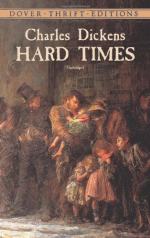|
This section contains 7,849 words (approx. 27 pages at 300 words per page) |

|
SOURCE: "Critique of Materialism-Criticism: Hard Times," in Charles Dickens: His Tragedy and Triumph, Volume Two, Simon and Schuster, 1952, pp. 801-19.
Johnson is one of the most prominent Dickens scholars of the mid to late twentieth century, and his two-volume Charles Dickens: His Tragedy and Triumph (1952) is considered an essential text on Dickens and his work. In the excerpt below, he provides a detailed examination of Dickens's anti-Utilitarian stance in Hard Times, noting that the novel's final scenes "hold . . . the essence of his defense of art. "
Hard Times brings to a culmination an orderly development of social analysis that extends in Dickens's work from Dombey and Son through Bleak House. That development has its roots, indeed, far earlier, and is to be found, although fragmentarily, in the social attitudes underlying Oliver Twist and the prison scenes of Pickwick Papers. With Dombey and Son, however, Dickens achieved his first clear...
|
This section contains 7,849 words (approx. 27 pages at 300 words per page) |

|


